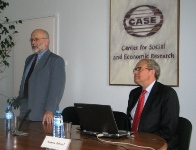Financial and Political Crisis in Ukraine, CASE Policy Research Seminar

Dr. Anders Aslund, keynote speaker at the CASE Policy Research Seminar, June 4, 2009, discussed the heated issue of the current “Financial and Political Crisis in Ukraine”. Aslund’s presentation contained findings from his recently published book, How Ukraine Became a Market Economy and Democracy, as well as from the latest developments in Ukrainian events. Recognizing the amount of damage Ukraine has experienced as a result of the global financial crisis, he believes that the nation has reached an “early bottom,” and is soon to embark upon a path to recovery. Evidence of Ukraine’s ability to endure the current crisis resides in several economic indicators. Dr. Aslund identified, among others, manageable budget deficits, low levels of existent public debt, falling inflation rates in the most recent months, and an adequate level of international reserves, as promising confirmation that Ukraine is equipped to weather the crisis.
Dr. Aslund explained that current trends have left Ukraine with little choice but to continue to lean to the West. Ukraine has emerged triumphantly from the gas wars with Russia, and political financing is “drying up,” leaving Ukraine less corrupt and less dependent on its Eastern neighbor. Due to its need of assistance from the IMF, cooperation with Europe, and other international support to overcome its crisis, Ukraine must continue to engage in its already Western leaning foreign policy. Aslund cited constitutional reform as a crucial challenge to overcome in order to enable progress in Ukraine. “Everyone agrees what must change in Ukraine, but no one agrees who should do it,” he explained about the current political atmosphere in Ukraine regarding constitutional reform. He believes that constitutional reform, which will shape the Ukrainian government into a parliamentary system, will provide hope for appeasing political divergence, ease the creation of effective coalition governments, and allow for more united decision-making on the economic policy front.
Dr. Aslund’s presentation generated a great deal of interest, initiating a lively question and answer session, as well as several interviews with the press following the event.
Presentation [download]
